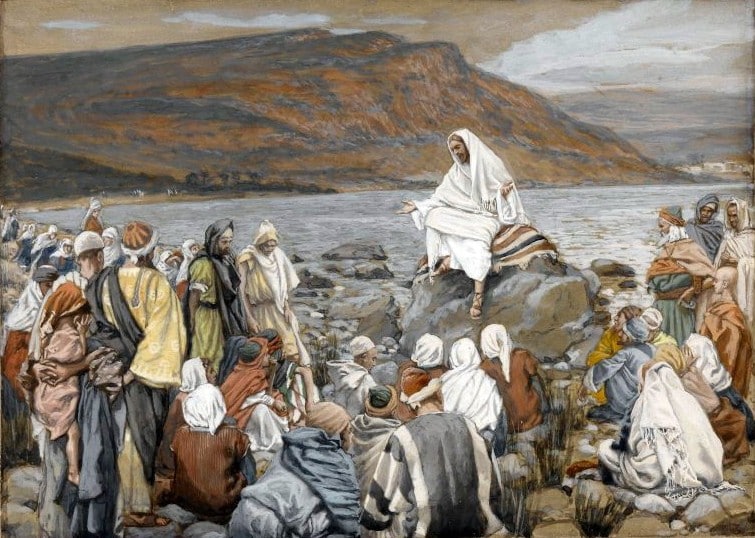The Gospels relate many people Jesus met and talked to during his three-year ministry. Some were friends and co-workers, such as his apostles and closest disciples. There were special people whom he helped and who became his followers, such as Mary Magdalene, the first to witness the risen Jesus. But in both the Gospels of Luke and John, Martha, Mary and their brother, Lazarus, truly stand out as very special friends.
This family lived in the town of Bethany, a couple miles southeast of Jerusalem. It seems Jesus felt very comfortable and welcome in their home. In fact, during the early days of Holy Week, Jesus spent his nights with these friends. During the days, he preached in Jerusalem. And it was during this week that Mary anointed Jesus’ feet and dried them with her hair—an act which upset Judas. He thought it was a waste of money, though Jesus said that it was a symbol of his upcoming death and burial. You’ll recall that it was Lazarus whom Jesus raised from the dead even after he had been in the tomb four days (John 11). And many people came to believe in Jesus after witnessing that astounding sight.
There is an incident about these two sisters that is so endearing because it describes our wounded human nature. It’s described in the Gospel of Luke. Jesus and some disciples had come from Jerusalem to stay the night at Martha and Mary’s home. Martha, being the elder sister and head of the house, is concerned with her role as hostess. After all, they will need something to eat and drink. The group sits and, lo and behold, Mary sits right at the feet of Jesus. It seems only Martha is aware of what is going on. She is left alone to take care of the guests.
Jesus starts teaching, and everyone around him is taken with his words. It seems that no one notices Martha’s predicament. In a way, Martha is isolated. Finally, she can stand it no longer. She comes out and interrupts Jesus to get him to send Mary into the kitchen to help. To Martha this is a reasonable request. But, to her surprise, Jesus gently chides her: “Martha, Martha, you are anxious and worried about many things. There is need of only one thing. Mary has chosen the better part and it will not be taken from her” (Luke 10:41).
Martha’s Possible Choices
It is just a homey scene: a guest of honor, two sisters who see the whole event differently and a moment of teaching by Jesus himself. We can say that Martha had a point: She was, after all, the hostess. She would see it has her duty to prepare something for her guests. Hospitality in Middle Eastern cultures was paramount. Mary, on the other hand, is taken by Jesus and his words, and she lost awareness of Martha’s predicament. She just wants to hear Jesus talk.
Martha could have dealt with this situation in three ways: 1) She could have said, “I would really like to hear Jesus. Given this circumstance with everyone around Jesus, he must be saying something important. I think I’ll sit down to listen and, when he is finished, Mary and I can get something together for our guests. 2) She could have said, “Well, I’m the hostess and, even though I would like to sit with the others and listen to Jesus, I’ll give that up and prepare something for my guests. And then, afterward, I can sit down with Mary, and she can tell me what Jesus said. 3) Or, finally, Martha might have said in anger and resentment, “Oh, let Mary sit out there and be special. I’ll fix something and let them know that I didn’t appreciate having to do all the work while my little sister, Mary, got to sit by Jesus and listen.”
In the first case, Martha would behave in a very appropriate way. An opportunity to hear Jesus preach and teach was too good to miss. She would do her best with Mary’s help to get something together for the visitors. But, she rightly thought, that they would understand her decision. None of them would have wanted to miss hearing Jesus.
In the second option, Martha also makes a solid decision: She’ll deny herself the chance to hear Jesus because she wants to meet her visitors’ needs. Hearing from Mary what Jesus said won’t be the same as being there, but she will have done both things: served her guests and heard what Jesus said. It’s the third option that Martha chooses and, in doing so, let her emotions of anger, frustration and self-pity control her judgment.
The Gospel’s Lesson for Our Own Struggles
But haven’t we all experienced those feelings of frustrations in family life? People can get into a snit. Even when another option presents itself as a good alternative, we refuse to take it because we sometimes bask in the “poor me/no one cares” feelings that soothe us.
Jesus’ apostles struggled with these feelings, too, more than once. When James and John’s mother asked Jesus to make sure her two sons sat on Jesus’ right and left when he came into his Kingdom, the 10 others heard that request and were upset, jealous and put out. We can’t blame them, especially when it seems that James and John put their mother up to making the request of Jesus (Matthew 20:20). Another time, Jesus was walking along and could hear his apostles arguing among themselves like little children. Who was first? Who was closest to Jesus? Who understood him the best? And so forth (Mark 9:9).
These are very human struggles—the “poor me” or “no one appreciates me or my efforts” feelings. Now, if I can catch myself in the midst of them and say, Lord, what’s going on inside me now? Why am I upset or having these feelings? then I can interrupt that negative and useless kind of thinking. It helps prevent a minor incident from causing serious harm to the very people we love. True, it is part of our humanness to go though these struggles at times. The Lord helps us understand ourselves at such times—that is, if we are able to turn our attention toward him. If we do, we can help our family relationships significantly.








